“During the war, we were on the same side of history: Poles, Jews, Russians and Ukrainians – we were all occupied and killed by Nazis,” former Polish president Aleksander Kwasniewski said this week in an interview with The Jerusalem Post.
He visited Israel this week as a member of an international senior delegation on behalf of the Babyn Yar Holocaust Memorial Center, where he is a member of the supervisory board.
“Of course, there were situations that some people were collaborating with Nazis,” Kwasniewski said. “But it was not the majority; it was not a big group. Yad Vashem memorial decorated these people who were very helpful towards their Jewish neighbors.”
“It is natural that each nation wants to see only these heroic pages in their history,” he said. “But sometimes we have very tragic and bad pages, or even shameful pages, and that is necessary to understand that history is complicated. I think after painful discussions we had in Poland, the public opinion was better, with better self-understanding.”
Kwasniewski served as president of Poland from 1995 to 2005. After the fall of Communism, he became a leader of the left-wing Social Democracy of the Republic of Poland, a successor to the former ruling Polish United Workers’ Party, and a cofounder of the Democratic Left Alliance.
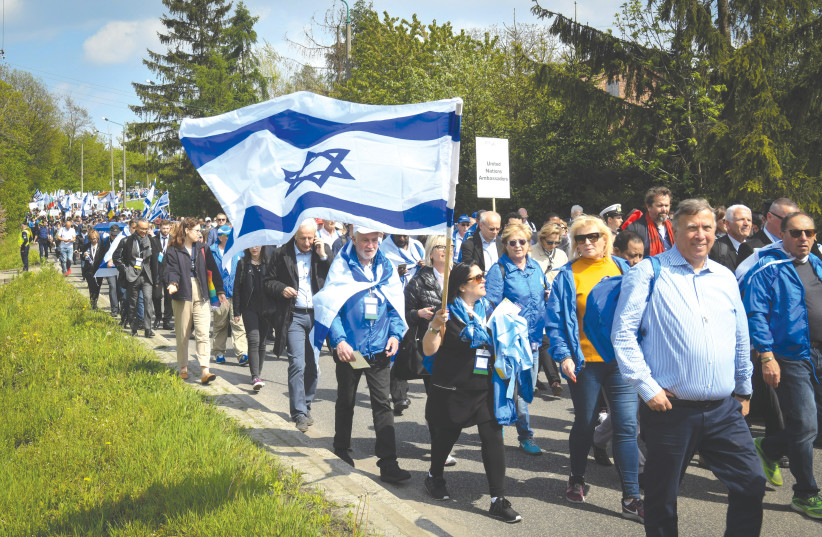
In 2021, Poland enacted a law setting a 30-year time limit on appealing decisions made by special administrative bodies, effectively meaning that owners of property seized in the communist era could no longer receive compensation. The law sparked a diplomatic incident with Israel.
“No, no. I’ll tell you what the difference is,” Kwasniewski said. “I was very much involved in all these problems of restitution and reprivatization. Here is something I want to say to the Israeli public: This problem in Poland is very, very complicated – much more complicated than in Czech [Republic], Hungary or other countries.
“Why? Because Poland is the only country that changed borders so much after World War II. We lost 40% of our territory in the East; we have 30% new territory in the West – former German territories.
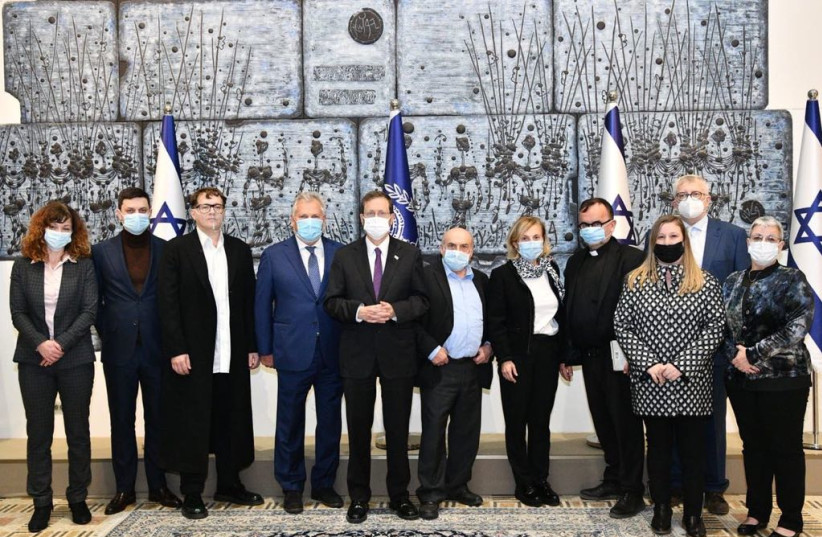
“Because of the Holocaust, we lost three million Polish citizens, Jews that were Polish citizens. In addition, many cities and villages were totally destroyed. Warsaw was 80% destroyed. Other cities were 60% or 70% destroyed. Therefore, normal reprivatization is impossible.
“So, for example, during my time as a president, we decided to give the possibility for Jewish organizations to [refurbish] some buildings such as synagogues and Jewish community centers. But with private property, the situation is very complicated. Because the problem was not generally solved, we had a lot of crime connected with this, because reprivatization was possible legally through the courts. Unfortunately, some people have a huge imagination, and they found some new ways how to use this situation for their own businesses.
“I think everything that the Polish government did in the last year wasn’t against Jews, it was not against Israel, it was how to make order with this situation.”
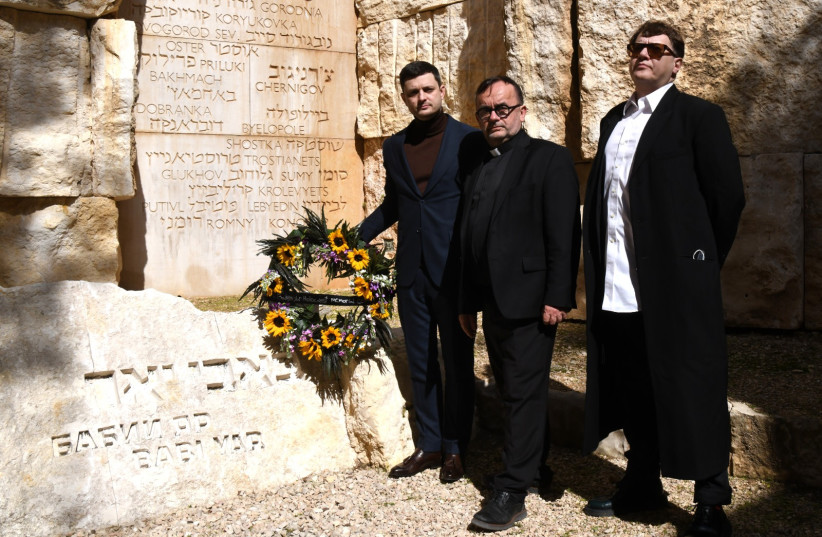
Yet Kwasniewski does have a bit of criticism toward the current Polish government.
“The mistake was that this question was not sufficiently discussed and explained to our Israeli counterparts in parliament as well as Jewish organizations in the United States,” he said. “It created, in my opinion, quite an artificial conflict, which was also exaggerated by the Israeli side. But this is an issue which we should have a very pragmatic way to solve by having a good and close dialogue with our Israeli partners and Jewish organizations.”
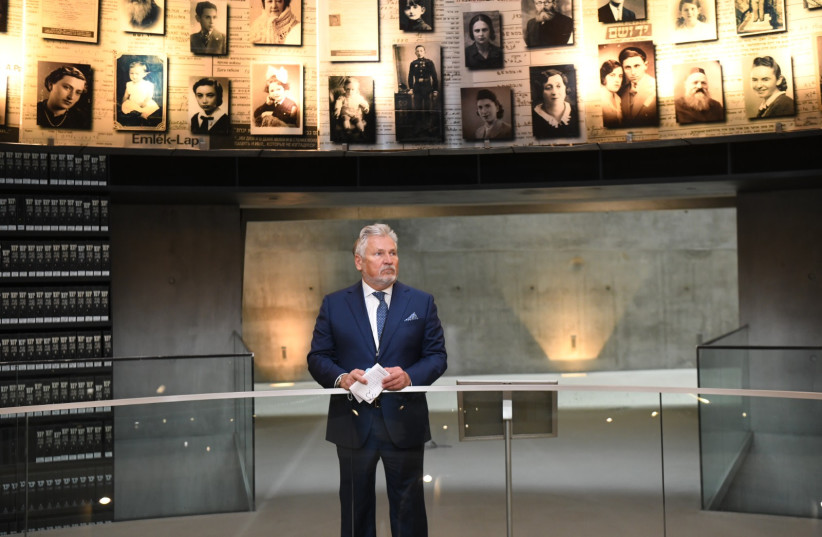
So you agree with the law, but you don’t agree with the way it was managed externally?
“The law is not against Jews. It’s against these mafias which started to do business with all this. For example, we had a situation where lawyers came on behalf of a lady who is 125 years old; you know, that’s something that is problematic. So I think that this decision [the law] was created in order to stop this.”
What type of groups of mafia are you talking about? Are they from around the world or from Poland?
“If there is a building in the center of Warsaw, for example, that is a good sell, no? They generally are from Poland but, of course, connected with specialists that know what is needed in this process. It was a very domestic issue. Unfortunately, we managed it in a very bad way.”
You mentioned the Polish-Israeli tension as a ‘nonnatural conflict,’ yet here in Israel, it is perceived as a very intense and serious one. There were public figures that called for canceling high-school trips to Poland – something that is very popular in Israel.
“No, this drama is wrong, because antisemitism exists in many places around the world. But I can tell you openly that in Poland that there still is a margin of antisemitism... Knowing Polish history, it cannot be acceptable. But still, Poland is very friendly, very open, and there is no reason to cancel any types of tourism, tours of students’ visits, cooperation and more.
“Please understand: We have more philosemites in Poland than antisemites. The Polish philosemites admire Jews and are very interested in Jewish history. Also, we must remember that our common history goes back so many years. Frankly speaking, if an Israeli says that there is not one drop of blood in his body from Poland, he is mistaken. The same for a Polish man or woman that says there is not one drop of Jewish blood in their body. So please, if you have any influence, please say to all our Israeli partners: Let’s continue the good cooperation with Poland because both sides need it.”
Kwasniewski said he was “very happy” that there is “a renaissance of the study of Hebrew language. We have Hebrew faculties in many Polish universities.”
The delegation members met this week with President Isaac Herzog, Knesset Speaker Mickey Levy, Foreign Minister Yair Lapid, Diaspora Affairs Minister Nachman Shai, MKs and Yad Vashem chairman Dani Dayan.
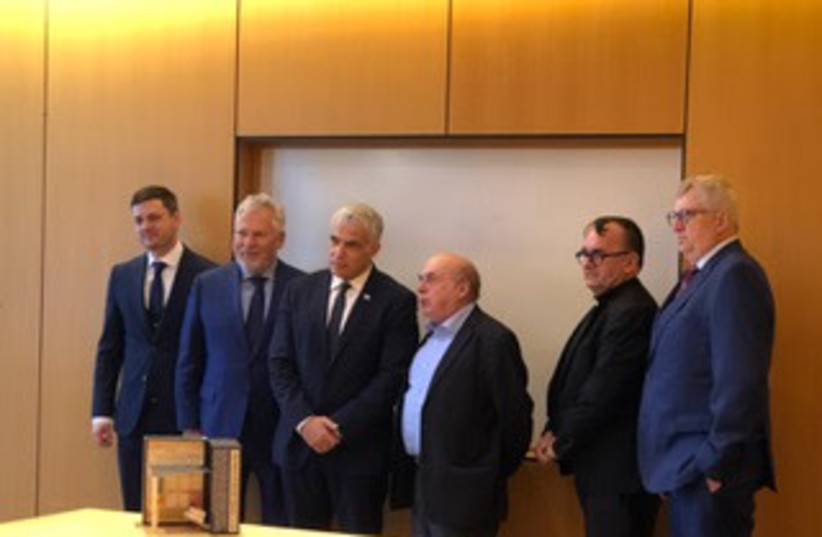
Delegation members included head of the supervisory board of Babyn Yar Memorial Natan Sharansky, head of the Academic Council Father Patrick Desbois, artistic director Ilya Khrzhanovsky and deputy director Ruslan Kavatsiuk.
“This project is of great importance to Ukraine and to the world,” Lapid told the delegation. “It is doing right with history and memory.”
During the Holocaust, some 1.5 million people were killed in the territory of today’s Ukraine, including 33,771 Jews shot dead in the Babyn Yar ravine in two days. During the Nazi occupation of Kyiv, from 1941-1943, some 70,000-100,000 people were killed in Babyn Yar, including Jews, Roma, Ukrainians and patients from the local psychiatric hospital.
The Babyn Yar Holocaust Memorial Center is a non-governmental charitable organization dedicated to honoring the memory of the victims of the Babyn Yar tragedy and promoting humanization by preserving and studying the history of the Holocaust.
Kwasniewski, who established the Polish Museum depicting 1,000 years of Jewish life in Poland, has served in recent years as a board member at the Babyn Yar Holocaust Remembrance Center. When the center is fully completed, it is expected to contribute significantly to Holocaust education and the fight against antisemitism.
“The establishment of the Holocaust Remembrance Center in Babyn Yar is important for everyone... for the victims of the Holocaust, for the Ukrainians... the Jewish people and the whole world... establishing this memorial center is our moral obligation,” he said.
Kwasniewski also addressed the Conference of Presidents of Major American Jewish Organizations in Israel and spoke about the current situation of Ukraine.
Kwasniewski concluded on a personal note.
“My grandmother was a great cook, and she made a few Jewish dishes,” he said. “One of them was what we call Jewish-style carp. When I first visited Jerusalem in 1987, I was at a restaurant and tried to explain what type of dish I was looking for. I said it’s a bit sweet, and they finally understood and answered, ‘Oh, you mean Warsaw-style carp. That’s what we call it in Jerusalem.’”
There is one more dish that Kwasniewski said he still hasn’t found a good version of here in Israel.
“My grandmother used to make us cholent. When I came to Israel in the ’80s, I looked for this dish everywhere. When I finally found a restaurant that served it, I was a bit surprised. It tasted very different. I still prefer my grandmother’s interpretation of it,” he said smiling.
Response from the WJRO
Responding to Kwasniewski's statements, the World Jewish Restitution Organization (WJRO), the world’s leading advocate for Holocaust-era property restitution in Central and Eastern Europe, vowed to keep fighting for justice for Holocaust survivors.
"The 2021 Polish law amending the Administrative Procedure Code has made it virtually impossible for all former Polish property owners – Jews and non-Jews alike – to secure redress for property illegally stolen during the Communist era," said WJRO chief of operations Gideon Taylor.
Taylor added that "A popular misconception about the law is that it was necessary to put an end to improprieties. However, the amendment provides no solutions to counteract abuses in property restitution cases, and instead uniformly closes the path to all individuals honestly raising justified claims. This new law demonstrates the need for Poland to once and for all settle the issue of private property by adopting comprehensive private property restitution legislation.
"Sadly, trying to close the door on property restitution is not an isolated action. In the past, there has been very limited success in court with private property cases from the Communist era, but the majority of cases have been unresolved."
Taylor concluded by saying "many Holocaust survivors and their families have been waiting for justice for too long. We will not stop seeking justice for Holocaust survivors and others.”
